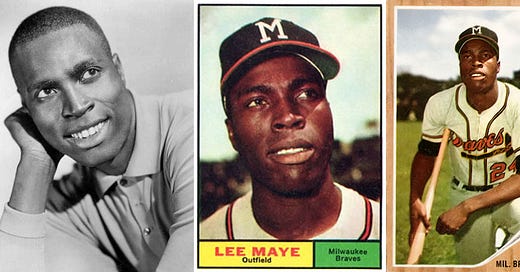Let’s talk about Arthur Lee Maye, baseball player and recording artist. Maybe the greatest singer to ever play Major League Baseball. And vice-versa. Both.
Maye was a speedy, left-handed hitting outfielder who played 13 season (1959-1971) with the Milwaukee Braves, Houston Astros, Cleveland Indians, Washington Senators, and Chicago White Sox. He went by Lee Maye.
That’s M-A-Y-E, not to be confused with the other Lee May (M-A-Y, no E). Ironically, the non-singing May was nicknamed “The Big Bopper.” He was a right-handed slugger with 354 home runs and three All-Star appearances with Cincinatti (1965-71), Houston (1972-74), and Baltimore (1975-80).
Do not dismay (sorry), we’ll get to Arthur Lee Maye’s recording career. It was prodigious. He released over 50 songs on 33 singles between 1954 and 1969.
He was born December 11, 1934 in Tuscaloosa, Alabama. The Maye family moved several times, eventually settling in Historic South Central Los Angeles, where Arthur Lee attended Jefferson High School.
Along with playing baseball, Maye took to singing in church and crooning a cappella in the halls of his high school with his classmates. Classmates that included future members of The Penguins (“Earth Angel”), The Platters, The Coasters, The Hollywood Flames, and Etta James. One of Maye’s closest friends was Richard Berry, who wrote and recorded the original version of “Louie Louie,” a cornerstone of western civilization.
This was GROUND ZERO for Southern California Doo-Wop.
Upon graduation in 1954, nineteen-year-old Maye signed a contract with Milwaukee Braves. Over the next five years, he would work his way up through the Braves system, excelling at every level.
And every off-season, he would record songs with his high school friends. At first, he tried to keep his baseball and recording personas separate. He was “Lee Maye” in baseball and “Arthur Lee Maye” as a singer.
I could easily post thirty songs, all killer, no filler. And I absolutely will in some future post. Today, we’re going to stick with just two stand-outs.
First up is “Oh Rooba Lee” from 1956 on Specialty Records, credited to Arthur Lee Maye and the Crowns (all Jefferson High alumni). You’ll notice the writing credit to Berry-Maye, one of the many collaborations between Richard Berry and our baseballer.
Good Lord. Why was this not a massive hit? Maybe because the song title is actually “Oh Ruby Lee” and the label is a typo?
Maye made his major league debut in July of 1959, hitting over .300 in 50 games. He split time in 1960 between AAA Louisville and Milwaukee, and was poised to be an everyday regular the next season. Injuries however plagued him throughout his career.
A shoulder injury on opening day 1961 derailed his season. A respiratory infection cost him two months in 1962. In 1963, he was a platoon right fielder having a good season, but a back injury ended it.
1964 was his best season, playing 153 games and leading the league in doubles. He put up almost 7 WAR (by Baseball Reference) between those 1963-1964 seasons.
While his baseball career was peaking, his musical productivity during this time stalled, with no official releases from 1960 to 1962. Lucky for us, he came back strong from 1963-1969.
His baseball and singing careers started to crossover. He was now a solo artist and his records companies were crediting him as “Lee Maye of the Milwaukee Braves.” TOPPS highlighted his singing on the back of his baseball cards.
In 1965, the Milwaukee Braves were a lame-duck team, having already agreed to move to Atlanta the next year. Maye injured his right knee early in the season and was traded to Houston.
Musically, this was a welcomed change for Maye. He signed with manager Huey P. Meaux, who recorded and released several Maye singles in the late 1960s. Maye also sang regularly at a club in Houston called The Dome Shadows.
You can really hear the influence of 1960s soul music on these Maye recordings. Today’s second track,“If You Leave Me” from 1968, is an especially interesting mash-up of ‘60s pop and the coming of ‘70s heavy soul.
I could not love this song more. It turns from 1963 to 1973 on a dime. Just amazing.
Maye’s last season in Major League Baseball was 1971. He tried to work in baseball after his playing days, but did not find any takers. He stopped recording. He eventually worked as a porter and food server for Amtrak for 20 years at LA’s Union Station before retiring.
Arthur Lee Maye passed away in 2002, in Riverside, California of cancer at just 67 years old. He’s buried in one of the great baseball cemeteries, Inglewood Park.
Remarkably, with all of Arthur Lee Maye’s incredible musical talent, he never had a hit single. None of his records ever even made the pop or R&B charts. Not one.
From an interview in Rocktober Magazine in 2001, Maye reflected on his dual career.
"When I was playing baseball all the requisite hours, I was a year behind in music, and I never got a chance to catch up with the music trend that I should have been with. I truly was behind the times, and I acknowledge that. Baseball and singing collided.
If I was playing baseball today, and the way I can sing, I would be double dynamite!
I have a wonderful life, and I enjoy people listening to my music. I never dreamt that people would still be playing them old funky records today. It's a thrill.”
The thrill is all ours, Mr. Maye.
This post is based on my presentation at the 2025 NINE Baseball Conference, an incredibly informative and welcoming weekend of baseball writers and researchers sharing their work.








Wow! Specialty Records was a big deal; Little Richard and others. So weird, that "1963 to 1973 on a dime." The Fifth Dimension had a similar dilemma, caught between musical and cultural shifts as documented in Questlove's awesome "Summer of Soul" doc.
Another new favorite player, lol... Thanks!